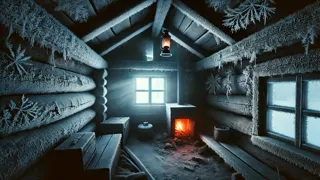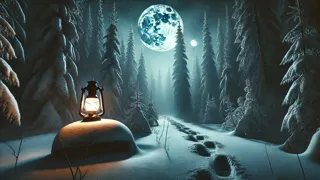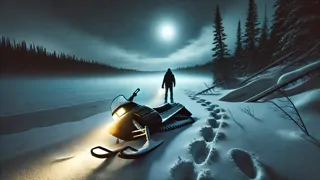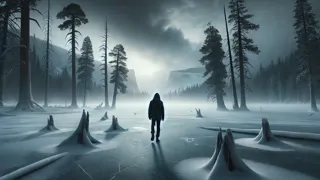Introduction
Cool Air opens in the heart of a remote wilderness blanketed under an unending palette of gray and white. Here a man known only by his chosen solitude has turned his back on warmth to embrace a life defined by bone-deep frost. Each morning, he steps onto a lake frozen solid, the ice humming under his boots as a brittle wind carves patterns along its surface. Around him, ancient pines stand sentinel, their branches bowed by heavy snow, and the sky hangs low with heavy clouds promising more winter’s cruelty. He lives in a microscopic cabin built with centuries-old timber, every beam cloaked in a lacework of rime that crackles before his eyes. A small wood stove burns with stubborn orange embers, its heat a meager shield against a world that would swallow him whole if given a chance. Day by day, he tests his limits, diving under the ice for a sip of water, venturing into drifting snowfields in search of game, and calibrating survival to a single pulse. Eating snow, he reminds himself of water’s bitter purity and tastes of memory and loss, as if each frozen shard holds the echo of a distant life left behind. While he hones his instincts, nights bring a spectral hush that can push a man to the brink, and cold dreams leave him waking to muffled sounds that vanish at dawn. This is not a quest for glory but a trial of will: a pursuit of truths hidden by memories of heat and human connection that he lost or chose to leave behind. The extremity of his mission feels like a rebuke to a world grown soft, yet with every pulse of adrenaline, the outside darkness seems to shift. He finds comfort in the monotony of his routine, yet dread lurks beneath the surface of his resolve, an invisible frost spreading through his thoughts. In this suspended silence, survival and obsession converge, setting the stage for questions that only the cold will answer.
Embracing the Freeze
He wakes before the first glimmer of light and steps out into an air so cold it seizes his breath mid-cycle. Each exhalation blossoms into a pale plume that drifts before settling on the rim of his hood. In those silent moments he feels the earth hold its own breath, waiting for the sun to force its way through a horizon buried in snow. His routine unfolds with precise care. He breaks the ice at the lake’s center where the water remains liquid beneath a translucent shell. Sensing the familiar tremor of liquid below, he dips his cup and retrieves a sip that tastes of iron and ancient snow. Then he moves along a narrow path to gather firewood, every step measured against the risk of slipping or stirring something unseen that has been lying dormant in the stillness.

Returning to the frost-lined cabin he pauses in the doorway and watches his footprints become indistinct under a floating veil of snow that falls without sound. Inside, timber walls etched with frostlines glow for a moment in the fire’s amber light before darkness reclaims each corner. He fans the embers and listens to the logs crack, each snap echoing in the small room like thunder in a canyon. He waits until the hearth warms his gloves before reaching in to poke the coals free, breathing gratefully as warmth flows through his fingers. The wind presses at the roof and rattles the thin glass of the single window, but he has learned its patterns, the way it moves from north to south like an unseen animal shifting in the night. Still, something has changed since his first days here. Patterns that once comforted him now trigger a prickle of dread in his spine, as if invisible footprints circle the cabin’s perimeter just beyond the firelight.
Shadows in the Snow
Nightfall arrives early, and darkness floods the land long before the moon finds its place in the sky. He straps on snowshoes and steps across the yard, each footfall muted by layers of fresh snow. Lantern in hand, he follows a winding trail toward a stand of pines that marks the forest boundary. The trees rise like silent sentinels, their trunks frosted white and their needles bending under the weight of centuries of snowfall. He moves slowly, senses sharpened by the absence of other travelers and the weight of his own solitude. At times he stops and listens, convinced he might hear breathing he cannot place.

On this night, the quiet is broken by a snap of wood a few yards away. His heart clamps into place so firmly he can feel the rhythm in his throat. He sets the lantern on a low boulder and grips a piece of antler he uses as a makeshift staff. A thin drift of snow swirls in the beam of light, and he waits for the next crack, scanning the perimeter for shifts in shadow or movement. Nothing appears, yet the sound lingers in his nerves.
With cautious steps he returns to the lantern and lifts it again. In its soft glow he sees footprints leading into the darkness, prints too large to match his own. Each impression is crisp, the snow firm as if pressed by a heavy boot, and no trail returns to the cabin. He follows them deeper into the forest, adrenaline sharpening his focus until the cold becomes a distant echo. Every breath burns, every muscle strains against friction, but he cannot stop until he knows what left those footprints and why they seem to vanish at the forest’s edge.
The Cold Truth
The trail ends at a clearing rimmed by stunted birch whose white bark glows in the dim moonlight. In the center lies an overturned snowmobile half buried in drifts, its engine silent and still. He moves closer, senses knotted with dread. The tracks around it are fresh, and he finds no sign of the rider. A crate strapped behind the seat sits empty, its lid ajar, revealing nothing but its frost-lined interior.

He circles the machine, studying every scratch in the metal, every dark smudge of soot on its body. Then he notices footprints leading away toward the lake, prints that do not match the profile of human boots but are deeper, wider, and oddly symmetrical. His pulse hammers in his ears as he follows them, his lantern lighting the way. When he reaches the shoreline, the footprints end abruptly at the edge of the ice. There are no cracks, no signs of entry, yet the snow around is disturbed as if something heavy slid into the water.
Cold terror grips him, but he steels himself and limps to his cabin, gathering tools and rope. He unwinds a coil of steel cable, fastens it to a heavy block of wood, and ties the other end to his belt. Heart pounding, he steps onto the ice and approaches the spot where the footprints stop. The lantern flame trembles, casting ghostlike shadows across the smooth surface. He tests the ice with his foot—solid. Taking a deep breath, he drops to his stomach and pulls himself forward, inch by inch, until he reaches the place where water flows silently beneath the sheet of ice. He braces the block, knifes the cable through the surface, and pries at a seam.
Minutes pass that feel like hours. Then, with a sharp crack, the ice surrenders. He draws back, hauling the block free and dragging what it holds onto the surface. There, frosted and half obscured, lies the missing crate. It is empty, but its presence delivers the final blow: he never found the rider because nobody drove the machine. It appeared on its own. The truth, as cold and inevitable as the air he breathes, sinks into him: some mysteries in this frozen world exist without human hand or explanation. And facing that vast unknown requires more than warmth—it demands unwavering resolve.
Conclusion
As dawn breaks one final time, he surveys the landscape that defined his purpose and his pain. The footprints that once unsettled him now seem like markers of an unseen guide, leading him through snowfields where darkness used to reign. Each shiver, each ache, reminds him of the cost of living at the edge of possibility and sanity. He no longer fears the hollow moans that rose in the night or the distant lights that flickered amid the pines. They became companions in the vast whiteness, reflections of his deepest question: what lies beyond endurance itself. Standing at the threshold between warmth and frost, he makes a choice not born of desperation but of quiet conviction. The brittle wind carries secrets only the resolute can decipher, and in that moment he understands that survival is more than breathing through frozen lungs. Its true measure is the distance traveled inside one’s own spirit when all comfort has melted away. And so he exhales the last whisper of fear, embracing the cool air as both challenge and sanctuary. As his breath mingles with the morning mist, he accepts the dual nature of the cold: it can destroy or reveal. In the silent expanse, he finds both an end and a beginning.

















